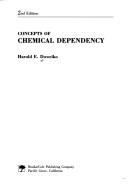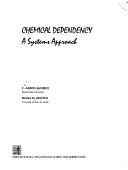| Listing 1 - 10 of 1885 | << page >> |
Sort by
|
Book
Year: 1993 Publisher: Alberta Alcohol and Drug Abuse Commission
Abstract | Keywords | Export | Availability | Bookmark
 Loading...
Loading...Choose an application
- Reference Manager
- EndNote
- RefWorks (Direct export to RefWorks)
Book
ISBN: 9781462502578 1462502571 Year: 2012 Publisher: New York: Guilford press,
Abstract | Keywords | Export | Availability | Bookmark
 Loading...
Loading...Choose an application
- Reference Manager
- EndNote
- RefWorks (Direct export to RefWorks)
"Widely adopted, this state-of-the-art text and clinical resource captures the breadth of current knowledge about substance abuse and its treatment. For each of the major evidence-based treatment approaches, a chapter on basic assumptions and theories is followed by a chapter on clinical applications, including illustrative case material. Expert contributors cover motivational, contingency management, cognitive-behavioral, 12-step, family, and pharmacological approaches. Concluding chapters discuss effective ways to integrate different treatments in a range of clinical settings. New to This Edition*Reflects significant advances in research and clinical practice.*Restructured to follow the typical sequence of treatment.*Chapter on the biology of substance use disorders.*Chapter on an additional treatment setting: primary care.*Chapter on case management."--Provided by publisher
Book
ISBN: 1138932485 9781138932500 1138932507 9781138932487 Year: 2018 Publisher: New York, NY: Routledge,
Abstract | Keywords | Export | Availability | Bookmark
 Loading...
Loading...Choose an application
- Reference Manager
- EndNote
- RefWorks (Direct export to RefWorks)
Treating Addictions: The Four Components offers a unique and coherent understanding of addiction. The book begins with a chapter discussing the framework of addiction and the four essential components of treatments―the fundamentals of addiction, co-occurring disorders, quality of life, and macro factors―and subsequent chapters elaborate on each component. Most currently available addiction treatment books present knowledge and skills in separate chapters and fail to integrate all chapters within a single framework that can weave all concepts into a meaningful tapestry. Using a unified framework, this book offers students a comprehensive skill set for treating addictions.

ISBN: 0534198848 Year: 1993 Publisher: Pacific Grove (Calif.) : Brooks/Cole,
Abstract | Keywords | Export | Availability | Bookmark
 Loading...
Loading...Choose an application
- Reference Manager
- EndNote
- RefWorks (Direct export to RefWorks)

ISBN: 0138592993 Year: 1994 Publisher: Englewood Cliffs (N.J.) : Prentice-Hall,
Abstract | Keywords | Export | Availability | Bookmark
 Loading...
Loading...Choose an application
- Reference Manager
- EndNote
- RefWorks (Direct export to RefWorks)
Book
Year: 1939 Publisher: S.l. : Doin,
Abstract | Keywords | Export | Availability | Bookmark
 Loading...
Loading...Choose an application
- Reference Manager
- EndNote
- RefWorks (Direct export to RefWorks)
Book
ISBN: 0323986277 0323988148 9780323988148 Year: 2023 Publisher: London: Academic Press,
Abstract | Keywords | Export | Availability | Bookmark
 Loading...
Loading...Choose an application
- Reference Manager
- EndNote
- RefWorks (Direct export to RefWorks)
"Substance Use and Addiction Research : Methodology, Mechanisms, and Therapeutics is an up-to-date, comprehensive, practical book on the research methodology for substance misuse and addiction intended for researchers and consumers of research information at all levels. The book is divided into three major parts: Research Methodology for Clinical Trials, Animal Research, and Retrospective Studies; Mechanisms of Drug Misuse and Addiction; and Investigative Therapeutics: Designing and Measuring Outcomes. It serves as a source that addresses all aspects of research design, methods, and analysis within the context of the field of opioids, alchohol, and other substances. The book discusses in detail the research methods used in designing prevention, screening, pharmacological management, and health services needed for substance misuse and addiction of all major illicit and prescribed drugs, foods, alcohol, and tobacco products. Research design and useful tips are provided for researchers and consumers of the literature, describing various biological methods, specialists, and analytical methods. The background is set up on the development of the discipline in question, its key features and applications, how the methods compare to other methods/analyses, and their advantages and limitations."--Back cover
Book
Year: 2006 Publisher: Copenhagen, Denmark : Nordic Council of Ministers,
Abstract | Keywords | Export | Availability | Bookmark
 Loading...
Loading...Choose an application
- Reference Manager
- EndNote
- RefWorks (Direct export to RefWorks)
Book
Year: 2021 Publisher: Paris, France : Ellipses,
Abstract | Keywords | Export | Availability | Bookmark
 Loading...
Loading...Choose an application
- Reference Manager
- EndNote
- RefWorks (Direct export to RefWorks)
Conforme à la réforme des ECNi/EDN Proposant des ouvrages de cours de référence, la collection ECNi - LES RÉFÉRENTIELS tient compte de l'évolution des enseignements et des besoins des étudiants qui préparent les ECNi. Ses auteurs.rices - tou.te.s exerçant en services universitaires - s'attachent à fournir au lecteur.rices un outil complet de révisions, conforme au programme du concours. Dans cet ouvrage, le programme de la spécialité Psychiatrie est traité de façon complète, avec : Un cours de référence en accord avec les conférences de consensus ; Des tableaux, des encadrés et de l'iconographie en couleur pour y voir plus clair ; L'essentiel à retenir. Cet ouvrage très explicatif facilite l'apprentissage des notions en privilégiant leur compréhension, afin de réussir les ECNi. Dr Clélia Quiles est Praticien Hospitalier dans le service du Pr Verdoux, Pôle UNIVersitaire de psychiatrie Adulte (UNIVA), responsable de l'unité d'électroconvulsivothérapie, de l'unité d'Évaluation, Soins Spécifiques et Orientation Rétablissement (ESSOR) de la Filière RÉtablissement en Psychiatrie Intersectorielle (REPI), et de l'Unité Transversale pour l'Éducation du Patient, au Centre Hospitalier Charles Perrens à Bordeaux. Dr Jean-Arthur MICOULAUD FRANCHI est Maître de Conférence Praticien Hospitalier à l'Université de Bordeaux, et exerce dans le service du Pr Philip, Service Universitaire de Médecine du Sommeil, dans le Pôle des Neurosciences Cliniques du CHU de Bordeaux. Il est chercheur associé dans le Laboratoire SANPSY (Sommeil - Addiction- Neuropsychiatrie).
Book
ISBN: 9782715417427 271541742X Year: 2023 Publisher: Paris : Presses Universitaires de France,
Abstract | Keywords | Export | Availability | Bookmark
 Loading...
Loading...Choose an application
- Reference Manager
- EndNote
- RefWorks (Direct export to RefWorks)
De toutes les conduites psychopathologiques, l'addiction est peut-être celle qui interroge le plus les limites entre le normal et le pathologique. La frontière entre ce qui relève des « mauvaises habitudes » et des vraies dépendances est difficile à tracer. Les addictions sont presque toujours des conduites relevant au départ de l'ordinaire, simplement déviées de leurs finalités initiales : boire, manger, jouer, acheter, travailler, se soigner, etc. Alors, tous dépendants ? Mathilde Saïet interroge le sens des addictions, analyse le mécanisme et les symptômes des plus courantes d'entre elles et propose une synthèse des différentes approches thérapeutiques possibles.
| Listing 1 - 10 of 1885 | << page >> |
Sort by
|

 Search
Search Feedback
Feedback About UniCat
About UniCat  Help
Help News
News